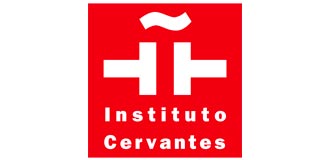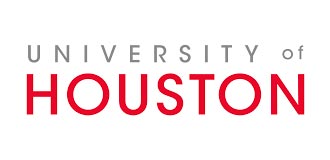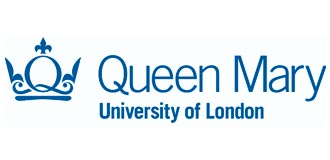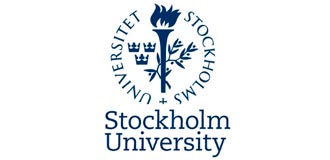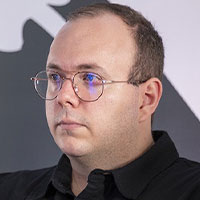Master’s Degree in Spanish as a Foreign Language: Didactics and Research Difusión
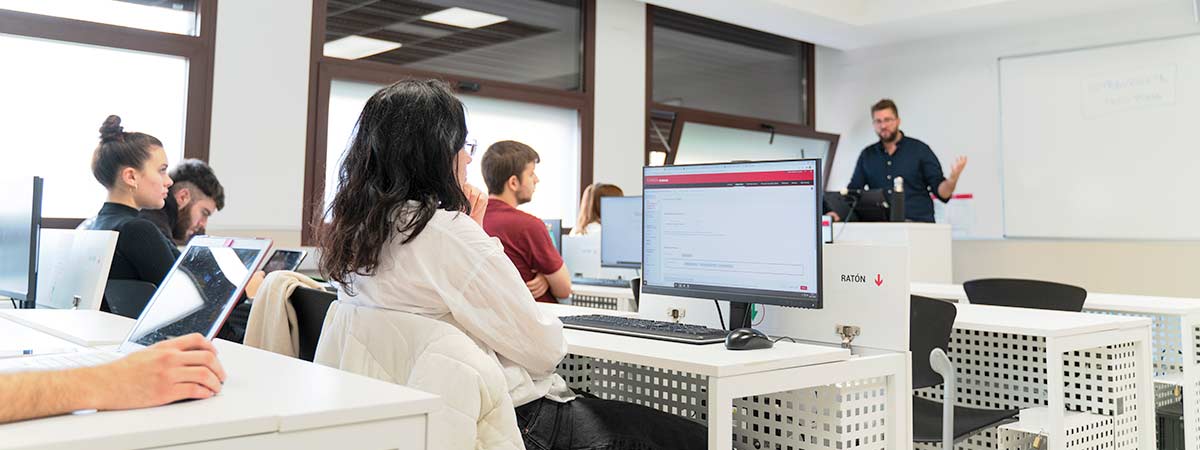
Spanish is more than just a language. It is culture, art, tradition, values and a way of thinking and feeling the world
The Master's Degree in Spanish as a Foreign Language: Didactics and Research has a double focus, professional and research, so that students decide their path based on the needs they have for their professional future.
The program responds to the growing demand for education that can be seen in native and non-native speakers who want to improve their linguistic, cultural and teaching skills, as well as in graduates of degrees from other disciplines who want to develop professionally as SFL teachers and do not have prior knowledge about the language and its didactics.
Nebrija University has Editorial Difusión as a partner of the program, which is a leader in Spain in creating educational materials and resources for teaching and learning Spanish as a foreign language (SFL).
The high percentages of employability of our graduates as SFL teachers prove the quality of the academic program, endorsed by the experience of more than 20 years of Nebrija University in training teachers and education professionals.
This official degree offers up-to-date content and a wide repertoire of subjects to design their own learning itinerary based on the students' training needs and professional interests. Contents and skills that respond to the new needs of the SFL teacher.
El Campus de Lenguas y Educación en Madrid-Arturo Soria de la Universidad Nebrija acogió las XII Jornadas Didácticas de ELE Difusión en Madrid, donde participaron 240 profesores de español de 32 países diferentes.
Student profile: Graduates of Bachelor's degrees or equivalent, in the areas of Philology, Linguistics, Translation, Education, Humanities and Communication Sciences.
The program may be accessed from other university degrees as long as the candidate has experience in teaching-learning other foreign languages, complementary training in foreign language teaching and the interests of a future SFL teacher.
Graduate profile:• Teachers of Spanish as a foreign language with solid knowledge of the language (C1), the culture and the didactics of Spanish as a FL.
• Professionals in the academic and scientific field of Linguistics applied to language teaching.
Official Degree:Master's Degree in Spanish as a Foreign Language: Didactics and Research
Learning Center:School of Language and Education
Branch of knowledge:Arts and Humanities
Places offered: • Face-to-face: 45
• Distance learning: 150
Total Credits 60 credits.
Minimum 12 ECTS credits and maximum 60 ECTS credits per enrollment and academic year
Part-time students:
Minimum ECTS credits: 12 • Maximum ECTS credits: 30
Academic year it was introduced: 2023/2024
Duration: 1 year.
Teaching Type: Face-to-Face – Distance learning
Academic Regulations: General student’s regulations. Credit transfer and recognition. Regulation of student participation. Common procedures for carrying out the Final Research Project
University Services: [+info]
Internal Quality Assurance System System managers Incidents, Suggestions and Complaints Job placement report and assessment of training received Degree memory
More than 20 years of experience training Spanish teachers
Curriculum
The student must take 60 credits
First Semester 30 ECTS
From October to January, both included- 5 ECTS | Acquisition, teaching and learning of SFL
- 5 ECTS | Lecture planning and management of the SFL classroom
- 5 ECTS | Design and evaluation of activities
- 5 ECTS | Lexicon and grammar in teaching SFL
- 5 ECTS | Sociolinguistics, pragmatics and interculturality
- 5 ECTS | Virtual learning environments and digital resources
Second Semester 30 ECTS
From February to June, both included
Professional itinerary- 4 ECTS | Teaching-learning contexts of SFL I
- 4 ECTS | Teaching-learning contexts of SFL II
- 4 ECTS | Pronunciation, intonation and spelling in SFL
Research itinerary- 4 ECTS | Research methodology in Applied Linguistics
- 4 ECTS | Analysis and transfer of results in Applied Linguistics I: qualitative studies
- 4 ECTS | Analysis and transfer of results in Applied Linguistics II: quantitative studies
Internships and FRP- 6 ECTS | Internships (teachers or researchers according to itinerary)
- 12 ECTS | Final Research Project
Professors
| Doctores Doctors | Doctores acreditados Accredited doctors |
| 70% | 30% |
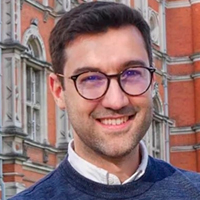 Dr. David Rodríguez Velasco
Director del Máster en Español como Lengua Extranjera: Didáctica e Investigación
Director of the Master’s Degree in Spanish as a Foreign Language: Didactics and Research Difusión
Doctor en Lingüística Aplicada por la Universidad Nebrija y Licenciado en Traducción e Interpretación por la Universidad Complutense de Madrid. Su tesis doctoral obtuvo la calificación Cum Laude en 2021. Ha trabajado como profesor de español en diversas universidades del Reino Unido (Queen Mary University of London, Royal Holloway University of London, Queen's University Belfast y University of East Anglia) y de China (Heilongjiang International University). Es investigador activo en el ámbito de los Estudios Hispánicos, con publicaciones en Sociolingüística, Pragmalingüística y Estudios de Género y Sexualidad. Sus líneas de investigación se centran en la competencia pragmática de los estudiantes, en especial en la expresión del desacuerdo en la comunicación digital en contextos académicos, y en el estudio sobre inclusión LGBTQ+ en la universidad, analizando tanto la experiencia de docentes y estudiantes como el tratamiento de estos temas en materiales didácticos y manuales de enseñanza de lenguas.
Dr. David Rodríguez Velasco
Director del Máster en Español como Lengua Extranjera: Didáctica e Investigación
Director of the Master’s Degree in Spanish as a Foreign Language: Didactics and Research Difusión
Doctor en Lingüística Aplicada por la Universidad Nebrija y Licenciado en Traducción e Interpretación por la Universidad Complutense de Madrid. Su tesis doctoral obtuvo la calificación Cum Laude en 2021. Ha trabajado como profesor de español en diversas universidades del Reino Unido (Queen Mary University of London, Royal Holloway University of London, Queen's University Belfast y University of East Anglia) y de China (Heilongjiang International University). Es investigador activo en el ámbito de los Estudios Hispánicos, con publicaciones en Sociolingüística, Pragmalingüística y Estudios de Género y Sexualidad. Sus líneas de investigación se centran en la competencia pragmática de los estudiantes, en especial en la expresión del desacuerdo en la comunicación digital en contextos académicos, y en el estudio sobre inclusión LGBTQ+ en la universidad, analizando tanto la experiencia de docentes y estudiantes como el tratamiento de estos temas en materiales didácticos y manuales de enseñanza de lenguas.
drodrigu@nebrija.es
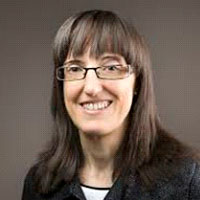 Dra. Susana Martín Leralta
Decana de la Facultad de Lenguas y Educación
Dra. Susana Martín Leralta
Decana de la Facultad de Lenguas y EducaciónProfesora Dean of the Faculty of Languages and Education
Professor Doctora por la Universidad de Bielefeld (Alemania). Su tesis doctoral, en el ámbito de la Lingüística aplicada a la enseñanza de ELE, obtuvo el Premio de Investigación de ASELE en 2008. Decana de la Facultad de Lenguas y Educación en la Universidad Nebrija, imparte clase en sus másteres para profesores de ELE. Sus líneas de investigación son el aprendizaje de español como lengua de migración, la adquisición de las destrezas comunicativas en ELE, y la evaluación de la competencia lingüística. Es miembro del Grupo de investigación LAELE de la Universidad Nebrija y de la red de grupos de investigación INMIGRA i+d de la Comunidad de Madrid. Es la investigadora principal del proyecto de I+D La emoción en el aprendizaje del español como lengua emocional y en la comunicación bilingüe en contexto de migración (EMILIA2) [PID2022-138973OB-C22]. Ha sido investigadora principal del proyecto Emoción, memoria, identidad lingüística y aculturación emocional: su influencia en el aprendizaje de español como lengua de migración (EMILIA) [FFI2017-83166-C2-2-R], así como del subproyecto del Grupo LAELE de la Universidad Nebrija en el Proyecto IN.MIGRA3-CM [H2019/HUM5772] y de los contratos Diploma LETRA -Certificación Lingüística para Trabajadores Inmigrantes en la Comunidad de Madrid- y COMUNÍCATE en español, ambos financiados por la Consejería de Asuntos Sociales de la Comunidad de Madrid. Ha publicado un libro, un manual didáctico y diversos artículos y capítulos en obras de referencia. Dirige la línea de investigación Migraciones e internacionalización del español en el Observatorio Nebrija del Español.
smartinl@nebrija.es
 Dra. María Cecilia Ainciburu
Profesora
Professor
Especialista en Filosofía del Lenguaje, en Letras y en adquisición de ELE y en su metodología de investigación. Ha obtenido sus titulaciones de posgrado en Argentina, Italia, EEUU y España.
Dra. María Cecilia Ainciburu
Profesora
Professor
Especialista en Filosofía del Lenguaje, en Letras y en adquisición de ELE y en su metodología de investigación. Ha obtenido sus titulaciones de posgrado en Argentina, Italia, EEUU y España.
Ha publicado trabajos en revistas y ha sido ponente en congresos internacionales. Ha participado en proyectos editoriales y de investigación, en Italia, España y en Alemania. La mayor parte de las publicaciones derivadas incluye el tratamiento de datos a partir de corpus de producción escrita y oral, nativa y no nativa
Realiza trabajos de dirección de la investigación en posgrado y doctorado en ámbito europeo. Ha dirigido 16 tesis doctorales sobre la adquisición del español como Lengua extranjera, especialmente de Pragmática léxica y textual, con relación con la Estructura lingüística de los géneros o con “Actos de habla” (petición, agradecimiento, desacuerdo) dentro de textos específicos de hablantes de lenguas maternas diferentes (inglés, árabe, italiano).
Ha formado parte del Comité de Organización o del Científico de numerosos congresos en el campo de la adquisición de las lenguas. Es editora responsable de la Revista Nebrija de Lingüística aplicada. Miembro del comité editorial de varias revistas y revisora externa de publicaciones en inglés, español e italiano del área, mayormente en los temas asociados al uso pragmático del vocabulario en ámbitos o contextos específicos como el académico, profesional o científico. La investigación actual se centra sobre ámbitos específicos e identidades no mayoritarias.
caincibu@nebrija.es
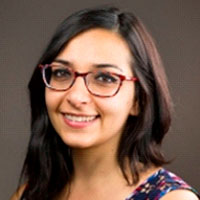 Dra. Zeina Alhmoud
Profesora
Professor
Doctora en Lingüística Aplicada por la Universidad de Granada (2016) y Licenciada en Lenguas Modernas por la Universidad de Jordania (2006). Imparte asignaturas en el Grado en Lenguas Modernas, el Grado en Educación Infantil y Primaria, y el Máster en Español como Lengua Extranjera. Sus líneas de investigación se centran en la Lingüística Cognitiva aplicada a la enseñanza y aprendizaje de segundas lenguas, el uso de la imagen como herramienta pedagógica y las creencias de los profesores sobre la enseñanza de la gramática. Entre sus publicaciones, es coautora e ilustradora de los siguientes libros: Enseñanza de Gramática Avanzada de ELE: Criterios y Recursos y Lingüística Cognitiva y Español LE/L2.
Dra. Zeina Alhmoud
Profesora
Professor
Doctora en Lingüística Aplicada por la Universidad de Granada (2016) y Licenciada en Lenguas Modernas por la Universidad de Jordania (2006). Imparte asignaturas en el Grado en Lenguas Modernas, el Grado en Educación Infantil y Primaria, y el Máster en Español como Lengua Extranjera. Sus líneas de investigación se centran en la Lingüística Cognitiva aplicada a la enseñanza y aprendizaje de segundas lenguas, el uso de la imagen como herramienta pedagógica y las creencias de los profesores sobre la enseñanza de la gramática. Entre sus publicaciones, es coautora e ilustradora de los siguientes libros: Enseñanza de Gramática Avanzada de ELE: Criterios y Recursos y Lingüística Cognitiva y Español LE/L2.
zdalhmoud@nebrija.es
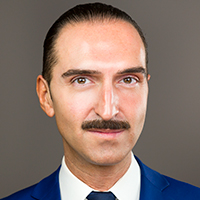 D. Rubén Darío Alves López
Profesor
Professor
Licenciado en Filología Inglesa y diplomado en Magisterio por la Universidad de Vigo. Máster en Lingüística Aplicada a la Enseñanza de Español como Lengua Extranjera y Máster en Enseñanza Bilingüe por la Universidad Antonio de Nebrija. Actualmente escribe su tesis doctoral sobre las nuevas tecnologías de la información y la comunicación aplicadas en el ámbito educativo. Cuenta con una amplia experiencia en el ámbito docente de lenguas. Es profesor de idiomas, competencias profesionales y nuevas tecnologías en campos tales como la Lingüística Aplicada o el uso de las TIC en educación desde el 2004. Ejerce su labor docente en universidades como Antonio de Nebrija, San Pablo CEU, CEA Global Campus (UNH – University of New Haven), Universidad Atlántica (Lisboa), Università Telematica Pegaso (Nápoles) y Carlos III (Madrid). Al estar tan involucrado en el sistema universitario, ha participado en numerosos congresos y publicados artículos relacionados con la enseñanza de lenguas extranjeras así como los procesos de implementación de las herramientas TIC en el ámbito educativo.
D. Rubén Darío Alves López
Profesor
Professor
Licenciado en Filología Inglesa y diplomado en Magisterio por la Universidad de Vigo. Máster en Lingüística Aplicada a la Enseñanza de Español como Lengua Extranjera y Máster en Enseñanza Bilingüe por la Universidad Antonio de Nebrija. Actualmente escribe su tesis doctoral sobre las nuevas tecnologías de la información y la comunicación aplicadas en el ámbito educativo. Cuenta con una amplia experiencia en el ámbito docente de lenguas. Es profesor de idiomas, competencias profesionales y nuevas tecnologías en campos tales como la Lingüística Aplicada o el uso de las TIC en educación desde el 2004. Ejerce su labor docente en universidades como Antonio de Nebrija, San Pablo CEU, CEA Global Campus (UNH – University of New Haven), Universidad Atlántica (Lisboa), Università Telematica Pegaso (Nápoles) y Carlos III (Madrid). Al estar tan involucrado en el sistema universitario, ha participado en numerosos congresos y publicados artículos relacionados con la enseñanza de lenguas extranjeras así como los procesos de implementación de las herramientas TIC en el ámbito educativo.
ralves@nebrija.es
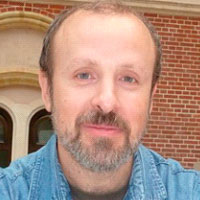 Dr. José Amenós Pons
Profesor
Professor
Licenciado en Filología Hispánica (Universidad de Barcelona), máster ELE (Universidad de Barcelona) y Doctor en Filología Hispánica (UNED). Ha enseñado español durante más de 25 años en distintos países e instituciones. Profesor titular del Instituto Cervantes y de las Escuelas Oficiales de Idiomas de Madrid, en situación de excedencia. Actualmente es profesor de lengua española en la Facultad de Filología de la Universidad Complutense de Madrid. Coautor de materiales didácticos para ELE en distintas editoriales. Investigador en las relaciones entre gramática y pragmática y en procesos de adquisición/aprendizaje de L2, ha participado en varios proyectos de investigación I+D relacionados con estos temas.
Dr. José Amenós Pons
Profesor
Professor
Licenciado en Filología Hispánica (Universidad de Barcelona), máster ELE (Universidad de Barcelona) y Doctor en Filología Hispánica (UNED). Ha enseñado español durante más de 25 años en distintos países e instituciones. Profesor titular del Instituto Cervantes y de las Escuelas Oficiales de Idiomas de Madrid, en situación de excedencia. Actualmente es profesor de lengua española en la Facultad de Filología de la Universidad Complutense de Madrid. Coautor de materiales didácticos para ELE en distintas editoriales. Investigador en las relaciones entre gramática y pragmática y en procesos de adquisición/aprendizaje de L2, ha participado en varios proyectos de investigación I+D relacionados con estos temas.
jamenos@nebrija.es
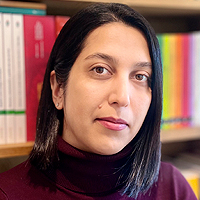 D.ª Tahereh Arabsaeidi Arabsaeidi
Profesora
Professor
Es personal docente e investigador en la Universidad Nebrija y doctoranda en Lingüística Aplicada a la Enseñanza de Lenguas. Cuenta con un Grado en Filología Hispánica, un Máster en Estudios Latinoamericanos y otro en Didáctica de ELE. A esta titulación suma diversos cursos de formación y especialización para profesores (diseño y creación de materiales, gamificación, etc.) en instituciones de referencia como el Instituto Cervantes y distintas universidades españolas. Con más de 13 años de experiencia en la enseñanza de ELE y EFE en diferentes contextos y niveles académicos (Universidad de Teherán y Universidad de Azores, entre otros), se ha especializado también en el diseño de materiales didácticos comunicativos. Sus áreas de interés son el diseño y creación de materiales, el español para fines específicos, la interculturalidad, la mediación y la emocionalidad. Es examinadora acreditada del DELE (niveles A1-C2) y ha colaborado con la Editorial Difusión en la auditoría de materiales para el Campus Difusión. Actualmente, imparte la asignatura de «Diseño y Evaluación de Actividades Comunicativas» en el Máster en Español como Lengua Extranjera: Didáctica e Investigación y es asistente de producción en la Revista Nebrija de Lingüística Aplicada a la Enseñanza de Lenguas.
D.ª Tahereh Arabsaeidi Arabsaeidi
Profesora
Professor
Es personal docente e investigador en la Universidad Nebrija y doctoranda en Lingüística Aplicada a la Enseñanza de Lenguas. Cuenta con un Grado en Filología Hispánica, un Máster en Estudios Latinoamericanos y otro en Didáctica de ELE. A esta titulación suma diversos cursos de formación y especialización para profesores (diseño y creación de materiales, gamificación, etc.) en instituciones de referencia como el Instituto Cervantes y distintas universidades españolas. Con más de 13 años de experiencia en la enseñanza de ELE y EFE en diferentes contextos y niveles académicos (Universidad de Teherán y Universidad de Azores, entre otros), se ha especializado también en el diseño de materiales didácticos comunicativos. Sus áreas de interés son el diseño y creación de materiales, el español para fines específicos, la interculturalidad, la mediación y la emocionalidad. Es examinadora acreditada del DELE (niveles A1-C2) y ha colaborado con la Editorial Difusión en la auditoría de materiales para el Campus Difusión. Actualmente, imparte la asignatura de «Diseño y Evaluación de Actividades Comunicativas» en el Máster en Español como Lengua Extranjera: Didáctica e Investigación y es asistente de producción en la Revista Nebrija de Lingüística Aplicada a la Enseñanza de Lenguas.
tarabsae@nebrija.es
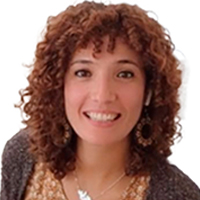 Dra. Khaoula Barhoumi
Profesora
Professor
Doctora en Investigaciones Humanísticas (Cum Laude) por la Universidad de Oviedo, Máster en Español como Lengua Extranjera por la misma universidad y licenciada en Lengua y Letras Españolas por la Universidad de Cartago (Túnez). Examinadora acreditada DELE y titulada experta en Interculturalidad, Justicia y Cambio Global (Universidad de Oviedo) y en Español y Tecnologías del Lenguaje (Universidad de Cantabria). Su tesis doctoral se centró en el análisis comparativo de varios actos de habla en árabe tunecino y español peninsular y su enseñanza a aprendices tunecinos de ELE. Ha participado en congresos internacionales y publicado artículos sobre la enseñanza de la sociopragmática en ELE.
Dra. Khaoula Barhoumi
Profesora
Professor
Doctora en Investigaciones Humanísticas (Cum Laude) por la Universidad de Oviedo, Máster en Español como Lengua Extranjera por la misma universidad y licenciada en Lengua y Letras Españolas por la Universidad de Cartago (Túnez). Examinadora acreditada DELE y titulada experta en Interculturalidad, Justicia y Cambio Global (Universidad de Oviedo) y en Español y Tecnologías del Lenguaje (Universidad de Cantabria). Su tesis doctoral se centró en el análisis comparativo de varios actos de habla en árabe tunecino y español peninsular y su enseñanza a aprendices tunecinos de ELE. Ha participado en congresos internacionales y publicado artículos sobre la enseñanza de la sociopragmática en ELE.
Cuenta con experiencia docente en universidades, academias y ONGs. Actualmente imparte docencia en el Máster en Español como Lengua Extranjera: Didáctica e Investigación de la Universidad de Nebrija, en las asignaturas Pragmática, Sociolingüística e Interculturalidad y Diseño y Evaluación de Actividades, labor que compagina con la enseñanza de español a personas migrantes y refugiadas.
kbarhoumi@nebrija.es
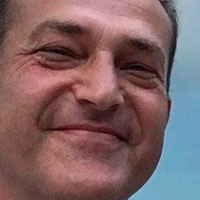 Dr. Kris Buyse
Profesor
Professor
Catedrático de lingüística en la KU Leuven, e investigador en la Universidad Nebrija. Su investigación y publicaciones se centran en didáctica de la lengua (léxico, expresión escrita, pronunciación, assessment, motivación), lingüística de corpus, lexicografía, lingüística contrastiva, lengua de herencia, LSP y CALL. Es (co)director de manuales y proyectos como Campus Sur, PortaVoces, UrgentiAS, Aprescrilov, Emilia y MusicLang.
Para más información, véase www.kuleuven.be/wieiswie/en/person/00012653 Orcid: https://orcid.org/0000-0003-1112-1708
Dr. Kris Buyse
Profesor
Professor
Catedrático de lingüística en la KU Leuven, e investigador en la Universidad Nebrija. Su investigación y publicaciones se centran en didáctica de la lengua (léxico, expresión escrita, pronunciación, assessment, motivación), lingüística de corpus, lexicografía, lingüística contrastiva, lengua de herencia, LSP y CALL. Es (co)director de manuales y proyectos como Campus Sur, PortaVoces, UrgentiAS, Aprescrilov, Emilia y MusicLang.
Para más información, véase www.kuleuven.be/wieiswie/en/person/00012653 Orcid: https://orcid.org/0000-0003-1112-1708
kbuyse@nebrija.es
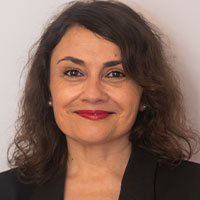 Dra. Cristina Casado Presa
Profesora
Professor
Profesora y directora del Grado en Lenguas Modernas Aplicadas de la Universidad Nebrija. Se graduó en Filología Inglesa por la Universidad de León, cursó un Máster en Lengua y Literatura Españolas en la State University of New York at Buffalo y obtuvo su Doctorado en Literatura, Lengua y Cultura de la Península Ibérica y las Américas en la University of North Carolina at Chapel Hill. Ha sido profesora en Washington College (Maryland, EE. UU.), donde fue reconocida con el Alumni Association’s Distinguished Teaching Award en 2019.
Posee una amplia trayectoria en la enseñanza del español en todos los niveles universitarios, tanto en modalidad presencial como en línea. Ha impartido cursos que abarcan desde español básico y de conversación hasta asignaturas avanzadas de lengua y cultura.
Dra. Cristina Casado Presa
Profesora
Professor
Profesora y directora del Grado en Lenguas Modernas Aplicadas de la Universidad Nebrija. Se graduó en Filología Inglesa por la Universidad de León, cursó un Máster en Lengua y Literatura Españolas en la State University of New York at Buffalo y obtuvo su Doctorado en Literatura, Lengua y Cultura de la Península Ibérica y las Américas en la University of North Carolina at Chapel Hill. Ha sido profesora en Washington College (Maryland, EE. UU.), donde fue reconocida con el Alumni Association’s Distinguished Teaching Award en 2019.
Posee una amplia trayectoria en la enseñanza del español en todos los niveles universitarios, tanto en modalidad presencial como en línea. Ha impartido cursos que abarcan desde español básico y de conversación hasta asignaturas avanzadas de lengua y cultura.
ccasado@nebrija.es
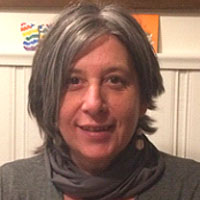 Dra. Nuria de la Torre García
Profesora
Professor
Doctora en Lingüística Aplicada a la Enseñanza de Lenguas (Premio Extraordinario de Doctorado) y Máster Universitario en Lingüística Aplicada a la Enseñanza del Español como Lengua Extranjera (Universidad Nebrija de Madrid). Tiene experiencia como profesora de ELE y formadora de profesores en el ámbito universitario (Universidad Kliment Ojridski de Sofia, Universidad de Murcia, Universidad de Zimbabue e Instituto Ivan Vasov / Universidad de Varna), en la enseñanza reglada preuniversitaria (Liceo Bilingüe Frederic Joliot-Curie de Varna) y en el Instituto Cervantes. Ha sido Profesora- Coordinadora del Aula Cervantes de Sofía y Responsable de la Cátedra Federico García Lorca de la Universidad de Indias Occidentales. Es autora de materiales didácticos y de publicaciones científicas en revistas de impacto. Actualmente trabaja como profesora en el Instituto Cervantes de Estocolmo. Sus áreas de interés son la evaluación de la expresión escrita, los corpus de aprendices de segundas lenguas, las TIC, la competencia audiovisual y la enseñanza de la gramática.
Dra. Nuria de la Torre García
Profesora
Professor
Doctora en Lingüística Aplicada a la Enseñanza de Lenguas (Premio Extraordinario de Doctorado) y Máster Universitario en Lingüística Aplicada a la Enseñanza del Español como Lengua Extranjera (Universidad Nebrija de Madrid). Tiene experiencia como profesora de ELE y formadora de profesores en el ámbito universitario (Universidad Kliment Ojridski de Sofia, Universidad de Murcia, Universidad de Zimbabue e Instituto Ivan Vasov / Universidad de Varna), en la enseñanza reglada preuniversitaria (Liceo Bilingüe Frederic Joliot-Curie de Varna) y en el Instituto Cervantes. Ha sido Profesora- Coordinadora del Aula Cervantes de Sofía y Responsable de la Cátedra Federico García Lorca de la Universidad de Indias Occidentales. Es autora de materiales didácticos y de publicaciones científicas en revistas de impacto. Actualmente trabaja como profesora en el Instituto Cervantes de Estocolmo. Sus áreas de interés son la evaluación de la expresión escrita, los corpus de aprendices de segundas lenguas, las TIC, la competencia audiovisual y la enseñanza de la gramática.
ntorre@nebrija.es
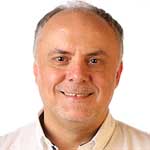 Dr. Carlos de Pablos Ortega
Profesor
Professor
Carlos de Pablos Ortega es profesor titular de español como lengua extranjera, lingüística y traducción audiovisual en la Universidad de East Anglia (Reino Unido) desde 2007. Es Doctor y Máster en Lingüística Aplicada por la Universidad Nebrija (Madrid) y licenciado en filología inglesa por la Universidad Complutense (Madrid). Ha desarrollado su labor docente en la Universidad de Bangor (Reino Unido), en Woodside High School (EE.UU), en el Centro de Estudios Hispánicos de la Universidad Nebrija en Madrid y en la Universidad de Sídney (Australia). Desde 2011 es profesor en el área de Sociolingüística y Pragmática en el Máster ELE de la Universidad Nebrija. Su labor docente ha sido reconocida con los premios a la excelencia docente en la Universidad de Sídney (2015-2016) y en la Universidad de East Anglia (2011 y 2021). Su investigación se centra en el ámbito de la pragmática contrastiva y de la traducción audiovisual. Ha publicado artículos en diversas revistas especializadas como Pragmatics, The Journal of Pragmatics o Pragmatics and Society. Es coautor del libro Seamos Pragmáticos: Introducción a la pragmática española, 2014, Yale University Press. Desde 2016 dirige el proyecto SAAM en el que alumnos voluntarios crean subtítulos interlingüales e intralingüales para organizaciones sin ánimo de lucro.
Dr. Carlos de Pablos Ortega
Profesor
Professor
Carlos de Pablos Ortega es profesor titular de español como lengua extranjera, lingüística y traducción audiovisual en la Universidad de East Anglia (Reino Unido) desde 2007. Es Doctor y Máster en Lingüística Aplicada por la Universidad Nebrija (Madrid) y licenciado en filología inglesa por la Universidad Complutense (Madrid). Ha desarrollado su labor docente en la Universidad de Bangor (Reino Unido), en Woodside High School (EE.UU), en el Centro de Estudios Hispánicos de la Universidad Nebrija en Madrid y en la Universidad de Sídney (Australia). Desde 2011 es profesor en el área de Sociolingüística y Pragmática en el Máster ELE de la Universidad Nebrija. Su labor docente ha sido reconocida con los premios a la excelencia docente en la Universidad de Sídney (2015-2016) y en la Universidad de East Anglia (2011 y 2021). Su investigación se centra en el ámbito de la pragmática contrastiva y de la traducción audiovisual. Ha publicado artículos en diversas revistas especializadas como Pragmatics, The Journal of Pragmatics o Pragmatics and Society. Es coautor del libro Seamos Pragmáticos: Introducción a la pragmática española, 2014, Yale University Press. Desde 2016 dirige el proyecto SAAM en el que alumnos voluntarios crean subtítulos interlingüales e intralingüales para organizaciones sin ánimo de lucro.
cpablos@nebrija.es
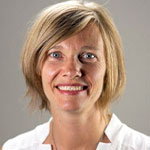 Dra. Alice Foucart
Profesora
Professor
Experta en psicolingüística. Su investigación se centra en el procesamiento del lenguaje en primer y segundo idioma y también investiga cómo el lenguaje influye en otros aspectos cognitivos, como la toma de decisiones, el procesamiento de emociones y la cognición social. Lleva a cabo su investigación empírica utilizando metodologías conductuales y (electro-) fisiológicas, como el eye-tracker y potenciales evocados (ERPs).
Tiene un doctorado de la University of Edinburgh (Reino Unido) y de la Université de Provence (Francia), un Máster en Ciencias del Lenguaje (Université de Provence, Francia, University of York, Reino Unido) y una licenciatura en inglés (Université de Lille, Francia). Trabajó sucesivamente como investigadora postdoctoral en tres instituciones del Reino Unido (Heriot-Watt University, University of Edinburgh y University of Bangor) y luego integró la Universitat Pompeu Fabra (España) antes de dirigir un proyecto Marie Sklodowska-Curie en Ghent University (Bélgica). Ahora es investigadora principal (acreditación R3) del grupo de investigación en Lingüística Aplicada a la Enseñanza de Lenguas Extranjeras (LAELE) en la Facultad de Lenguas y Educación, y del Centro de Investigación Nebrija en Cognición (CINC) de la Universidad Nebrija.
Enseña Lingüística (francesa), Psicología, Neurociencia en los niveles de licenciatura y maestría e imparte seminarios al nivel de doctorado.
Dra. Alice Foucart
Profesora
Professor
Experta en psicolingüística. Su investigación se centra en el procesamiento del lenguaje en primer y segundo idioma y también investiga cómo el lenguaje influye en otros aspectos cognitivos, como la toma de decisiones, el procesamiento de emociones y la cognición social. Lleva a cabo su investigación empírica utilizando metodologías conductuales y (electro-) fisiológicas, como el eye-tracker y potenciales evocados (ERPs).
Tiene un doctorado de la University of Edinburgh (Reino Unido) y de la Université de Provence (Francia), un Máster en Ciencias del Lenguaje (Université de Provence, Francia, University of York, Reino Unido) y una licenciatura en inglés (Université de Lille, Francia). Trabajó sucesivamente como investigadora postdoctoral en tres instituciones del Reino Unido (Heriot-Watt University, University of Edinburgh y University of Bangor) y luego integró la Universitat Pompeu Fabra (España) antes de dirigir un proyecto Marie Sklodowska-Curie en Ghent University (Bélgica). Ahora es investigadora principal (acreditación R3) del grupo de investigación en Lingüística Aplicada a la Enseñanza de Lenguas Extranjeras (LAELE) en la Facultad de Lenguas y Educación, y del Centro de Investigación Nebrija en Cognición (CINC) de la Universidad Nebrija.
Enseña Lingüística (francesa), Psicología, Neurociencia en los niveles de licenciatura y maestría e imparte seminarios al nivel de doctorado.
afoucart@nebrija.es
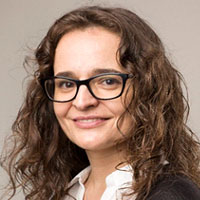 Dra. Marta Gallego García
Profesora
Professor
Marta Gallego-García es doctora en Lingüística Aplicada por la Universidad Nebrija (España) y la KU Leuven (Bélgica), máster en Lingüística Aplicada a la enseñanza de ELE y licenciada en Psicopedagogía. Miembro del grupo de investigación LAELE (Lingüística Aplicada a la enseñanza de lenguas extranjeras) de la Universidad Nebrija, ha investigado el mantenimiento del español como lengua de origen y como lengua de herencia en Bélgica a través de estudios translingüísticos y transculturales de la emocionalidad. Otras líneas de investigación de su interés son la pragmática y la identidad en los procesos migratorios, la didáctica de ELE, la evaluación y la enseñanza del español como lengua de herencia en Europa. Ha trabajado en Bélgica, Brasil, China y España como profesora de español en instituciones de enseñanza superior, empresas, asociaciones y academias, con niños, jóvenes y adultos. En la actualidad es docente en la Universidad Nebrija, en el Máster en Español como lengua extranjera: didáctica e investigación.
Dra. Marta Gallego García
Profesora
Professor
Marta Gallego-García es doctora en Lingüística Aplicada por la Universidad Nebrija (España) y la KU Leuven (Bélgica), máster en Lingüística Aplicada a la enseñanza de ELE y licenciada en Psicopedagogía. Miembro del grupo de investigación LAELE (Lingüística Aplicada a la enseñanza de lenguas extranjeras) de la Universidad Nebrija, ha investigado el mantenimiento del español como lengua de origen y como lengua de herencia en Bélgica a través de estudios translingüísticos y transculturales de la emocionalidad. Otras líneas de investigación de su interés son la pragmática y la identidad en los procesos migratorios, la didáctica de ELE, la evaluación y la enseñanza del español como lengua de herencia en Europa. Ha trabajado en Bélgica, Brasil, China y España como profesora de español en instituciones de enseñanza superior, empresas, asociaciones y academias, con niños, jóvenes y adultos. En la actualidad es docente en la Universidad Nebrija, en el Máster en Español como lengua extranjera: didáctica e investigación.
mgallego@nebrija.es
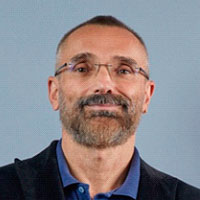 D. Agustín Garmendia Iglesias
Profesor
Professor
Agustín Garmendia es formador de profesores, autor de materiales y director del departamento de Edición Internacional (ELE/2, FLE/2 e ILS/2) de la editorial Difusión.
Como formador de profesores, ha impartido asignaturas de máster en varias universidades y ha realizado seminarios y talleres en universidades e institutos Cervantes de todo el mundo.
Desde 1996 está vinculado a la editorial Difusión, donde ha dirigido las labores de edición de numerosos proyectos. Es también coautor de las colecciones Aula, Bitácora y de la colección de francés Version originale.
D. Agustín Garmendia Iglesias
Profesor
Professor
Agustín Garmendia es formador de profesores, autor de materiales y director del departamento de Edición Internacional (ELE/2, FLE/2 e ILS/2) de la editorial Difusión.
Como formador de profesores, ha impartido asignaturas de máster en varias universidades y ha realizado seminarios y talleres en universidades e institutos Cervantes de todo el mundo.
Desde 1996 está vinculado a la editorial Difusión, donde ha dirigido las labores de edición de numerosos proyectos. Es también coautor de las colecciones Aula, Bitácora y de la colección de francés Version originale.
jgarmend@nebrija.es
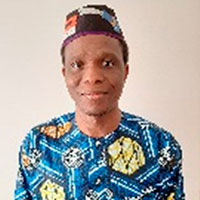 Dr. Roméo Gbaguidi Megninou
Profesor
Professor
Presidente y director de investigaciones del Think-tank LemAfriQ (Laboratorio del Estudio de las Migraciones Africanas), presidente de la Asociación Destino Benín y profesor asociado en la Universidad Antonio de Nebrija. Es experto en procesos migratorios, especialmente entre África y Europa y ha trabajado como mediador intercultural en el Centro de Participación e Integración de Inmigrantes Hispano-Africano de la Comunidad de Madrid (2006-2008), del cual también fue director (2008-2010). Es Doctor en Humanidades en el Área de Lengua Española, por la Universidad Carlos III de Madrid, Licenciado en Estudios Hispánicos y Afro-Iberoamericanos y Técnico Superior en Biblioteconomía-Documentación por la Universidad de Abomey-Calavi (Benín).
Sus principales líneas de investigación son: la interculturalidad, la geoestrategia y gestión de la diversidad, las migraciones internacionales y las Religiones Tradicionales Africanas.
Dr. Roméo Gbaguidi Megninou
Profesor
Professor
Presidente y director de investigaciones del Think-tank LemAfriQ (Laboratorio del Estudio de las Migraciones Africanas), presidente de la Asociación Destino Benín y profesor asociado en la Universidad Antonio de Nebrija. Es experto en procesos migratorios, especialmente entre África y Europa y ha trabajado como mediador intercultural en el Centro de Participación e Integración de Inmigrantes Hispano-Africano de la Comunidad de Madrid (2006-2008), del cual también fue director (2008-2010). Es Doctor en Humanidades en el Área de Lengua Española, por la Universidad Carlos III de Madrid, Licenciado en Estudios Hispánicos y Afro-Iberoamericanos y Técnico Superior en Biblioteconomía-Documentación por la Universidad de Abomey-Calavi (Benín).
Sus principales líneas de investigación son: la interculturalidad, la geoestrategia y gestión de la diversidad, las migraciones internacionales y las Religiones Tradicionales Africanas.
aromeo@ebrija.es
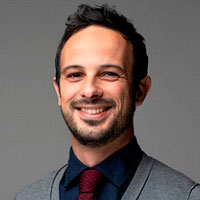 Dr. Jorge González Alonso
Profesor
Professor
Doctorado en Adquisición de Lenguas en Contextos Multilingües por la Universidad del País Vasco (UPV/EHU). Antes de unirse a la Universidad Nebrija, ocupó puestos postdoctorales en universidades de España (UPV/EHU), Reino Unido (University of Reading) y Noruega (UiT The Arctic University of Norway). Actualmente, es Subdirector del Centro de Investigación Nebrija en Cognición (CINC), Investigador Senior en el Centro para el Lenguaje, el Cerebro y el Aprendizaje (C-LaBL; Noruega), e Investigador Principal de tres proyectos financiados por la Comunidad de Madrid, el Consejo de Investigación de Noruega y el Ministerio de Ciencia e Innovación de España, respectivamente. A lo largo de su carrera, ha publicado dos libros y más de 30 artículos y capítulos de libros. Su investigación se centra en el procesamiento del lenguaje (especialmente el procesamiento léxico y morfosintáctico) por hablantes nativos y no nativos, así como en las bases neuronales de la adquisición de segundas y terceras lenguas, que estudia utilizando técnicas como la electroencefalografía (EEG) o el registro de movimientos oculares (eye-tracking). Ha impartido clases tanto a nivel nacional como internacional sobre temas de psicolingüística, neurolingüística, adquisición de lenguas, diseño de investigación y análisis estadístico.
Dr. Jorge González Alonso
Profesor
Professor
Doctorado en Adquisición de Lenguas en Contextos Multilingües por la Universidad del País Vasco (UPV/EHU). Antes de unirse a la Universidad Nebrija, ocupó puestos postdoctorales en universidades de España (UPV/EHU), Reino Unido (University of Reading) y Noruega (UiT The Arctic University of Norway). Actualmente, es Subdirector del Centro de Investigación Nebrija en Cognición (CINC), Investigador Senior en el Centro para el Lenguaje, el Cerebro y el Aprendizaje (C-LaBL; Noruega), e Investigador Principal de tres proyectos financiados por la Comunidad de Madrid, el Consejo de Investigación de Noruega y el Ministerio de Ciencia e Innovación de España, respectivamente. A lo largo de su carrera, ha publicado dos libros y más de 30 artículos y capítulos de libros. Su investigación se centra en el procesamiento del lenguaje (especialmente el procesamiento léxico y morfosintáctico) por hablantes nativos y no nativos, así como en las bases neuronales de la adquisición de segundas y terceras lenguas, que estudia utilizando técnicas como la electroencefalografía (EEG) o el registro de movimientos oculares (eye-tracking). Ha impartido clases tanto a nivel nacional como internacional sobre temas de psicolingüística, neurolingüística, adquisición de lenguas, diseño de investigación y análisis estadístico.
jgonzalezal@nebrija.es
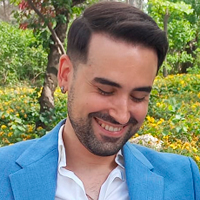 D. Iker González García
Profesor
Professor
Diplomado como Maestro de Educación Primaria por la Universidad de Magisterio de Bilbao y Máster en Enseñanza de ELE por la Universidad Nebrija. Actualmente es profesor de español en el Centro de Estudios Hispánicos Nebrija, docente de la asignatura Competencias Comunicativas en diferentes grados de la Facultad Politécnica y la Facultad de Comunicación y Artes, y profesor de la asignatura Planificación de clases y gestión del aula del Máster de ELE. Asimismo, es uno de los responsables del Centro de Escritura Nebrija, un servicio gratuito ofrecido por la universidad cuyo objetivo es apoyar a su comunidad en el desarrollo de la competencia lectoescritora.
D. Iker González García
Profesor
Professor
Diplomado como Maestro de Educación Primaria por la Universidad de Magisterio de Bilbao y Máster en Enseñanza de ELE por la Universidad Nebrija. Actualmente es profesor de español en el Centro de Estudios Hispánicos Nebrija, docente de la asignatura Competencias Comunicativas en diferentes grados de la Facultad Politécnica y la Facultad de Comunicación y Artes, y profesor de la asignatura Planificación de clases y gestión del aula del Máster de ELE. Asimismo, es uno de los responsables del Centro de Escritura Nebrija, un servicio gratuito ofrecido por la universidad cuyo objetivo es apoyar a su comunidad en el desarrollo de la competencia lectoescritora.
Ha trabajado como asistente en la Cátedra Global Nebrija-Santander del Español como Lengua de Migrantes y Refugiados, donde ha coordinado cursos de español para sinohablantes en la Comunidad de Madrid. También ha sido docente y creador de talleres de enseñanza de ELE dirigidos a profesores y coordinadores de la Cruz Roja Española.
igonzaga@nebrija.es
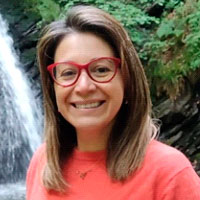 D.ª Kely Goze Ferreira
Profesora
Professor
Profesora de Lengua Española con Máster en Lingüística Aplicada a la Enseñanza del Español Lengua Extranjera por la Universidad Antonio de Nebrija.
Su investigación se centra en Interlengua, Análisis de Error y Análisis Contrastivo en la adquisición de lenguas afines. Especialista en pedagogía y educación por la Universidad Federal Rio Grande do Sul, Brasil, y licenciada en Filología, doble lengua, español/portugués para extranjeros, en la Pontificia Universidad Católica, Rio Grande do Sul, Brasil. Ha trabajado con estudiantes de lenguas afines en Brasil, España e Italia. En Brasil, se dedica a proyectos relacionados con la construcción de materiales para jóvenes y adultos. Trabajó 15 años en la enseñanza reglada como profesora de español lengua extranjera en colegios y universidades en Brasil. Coordinó el proyecto La lengua española y el teatro en el Instituto Técnico de la Universidad Federal de Porto Alegre, Brasil, y el centro de estudios Personae Idiomas. Participó como coordinadora de plan de curso y en la creación de materiales en la Universidad UNILASALLE y el Instituto Meta.
Ha escrito artículos sobre tecnologías educativas e inclusión del español como lengua de integración. Actualmente, colabora en la producción de materiales de lenguas afines, como profesora y tutora en la Universidad Antonio de Nebrija, y trabaja como profesora de Lengua Española y Lengua Portuguesa para extranjeros.
D.ª Kely Goze Ferreira
Profesora
Professor
Profesora de Lengua Española con Máster en Lingüística Aplicada a la Enseñanza del Español Lengua Extranjera por la Universidad Antonio de Nebrija.
Su investigación se centra en Interlengua, Análisis de Error y Análisis Contrastivo en la adquisición de lenguas afines. Especialista en pedagogía y educación por la Universidad Federal Rio Grande do Sul, Brasil, y licenciada en Filología, doble lengua, español/portugués para extranjeros, en la Pontificia Universidad Católica, Rio Grande do Sul, Brasil. Ha trabajado con estudiantes de lenguas afines en Brasil, España e Italia. En Brasil, se dedica a proyectos relacionados con la construcción de materiales para jóvenes y adultos. Trabajó 15 años en la enseñanza reglada como profesora de español lengua extranjera en colegios y universidades en Brasil. Coordinó el proyecto La lengua española y el teatro en el Instituto Técnico de la Universidad Federal de Porto Alegre, Brasil, y el centro de estudios Personae Idiomas. Participó como coordinadora de plan de curso y en la creación de materiales en la Universidad UNILASALLE y el Instituto Meta.
Ha escrito artículos sobre tecnologías educativas e inclusión del español como lengua de integración. Actualmente, colabora en la producción de materiales de lenguas afines, como profesora y tutora en la Universidad Antonio de Nebrija, y trabaja como profesora de Lengua Española y Lengua Portuguesa para extranjeros.
kgoze@nebrija.es
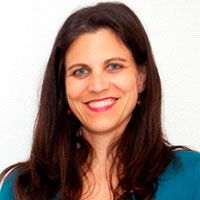 D.ª Alexandra Gutiérrez Díez
Profesora
Professor
He sido profesora de ELE desde hace 20 años, y he impartido clases tanto en universidades extranjeras en Austria, Hungría y China como en academias y centros de idiomas en Turquía y España. En los últimos 9 años me he dedicado casi exclusivamente a la enseñanza de la pronunciación de ELE online en mi academia Spanish Pronunciation Academy. Tengo especial predilección por el análisis del español conversacional y también por la formación en pronunciación de profes de ELE.
D.ª Alexandra Gutiérrez Díez
Profesora
Professor
He sido profesora de ELE desde hace 20 años, y he impartido clases tanto en universidades extranjeras en Austria, Hungría y China como en academias y centros de idiomas en Turquía y España. En los últimos 9 años me he dedicado casi exclusivamente a la enseñanza de la pronunciación de ELE online en mi academia Spanish Pronunciation Academy. Tengo especial predilección por el análisis del español conversacional y también por la formación en pronunciación de profes de ELE.
agutierd@ebrija.es
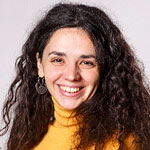 Dra. Cristina Herrero Fernández
Profesora
Professor
Cristina Herrero Fernández es Doctora en Lingüística aplicada a la enseñanza de lenguas por la Universidad Nebrija, Máster por la misma Universidad y Licenciada en Traducción e Interpretación por la Universidad de Salamanca. Es profesora del Máster en ELE de la Universidad Nebrija, investigadora del proyecto de I+D La emoción en español como lengua adicional y en la comunicación bilingüe en contexto de migración (EMILIA2) [PID2022-138973OB-C22] y miembro de la Red de investigación INMIGRA de la Comunidad de Madrid. Sus líneas de trabajo son la adquisición del componente fonopragmático y los rasgos prosódicos de la expresión lingüística, cortés y emocional en español, sobre lo que ha publicado artículos científicos y capítulos en libros de referencia. Ha trabajado como profesora, examinadora, traductora e intérprete en países como China, Corea, Austria, Irlanda, India y Nueva Zelanda. Compagina su labor docente con la formación de profesores y la edición y creación de material didáctico para instituciones públicas y privadas. Es coautora de varios manuales de ELE para niños, adolescentes y adultos.
Dra. Cristina Herrero Fernández
Profesora
Professor
Cristina Herrero Fernández es Doctora en Lingüística aplicada a la enseñanza de lenguas por la Universidad Nebrija, Máster por la misma Universidad y Licenciada en Traducción e Interpretación por la Universidad de Salamanca. Es profesora del Máster en ELE de la Universidad Nebrija, investigadora del proyecto de I+D La emoción en español como lengua adicional y en la comunicación bilingüe en contexto de migración (EMILIA2) [PID2022-138973OB-C22] y miembro de la Red de investigación INMIGRA de la Comunidad de Madrid. Sus líneas de trabajo son la adquisición del componente fonopragmático y los rasgos prosódicos de la expresión lingüística, cortés y emocional en español, sobre lo que ha publicado artículos científicos y capítulos en libros de referencia. Ha trabajado como profesora, examinadora, traductora e intérprete en países como China, Corea, Austria, Irlanda, India y Nueva Zelanda. Compagina su labor docente con la formación de profesores y la edición y creación de material didáctico para instituciones públicas y privadas. Es coautora de varios manuales de ELE para niños, adolescentes y adultos.
cherrerof@nebrija.es
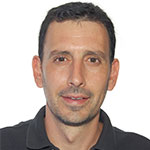 Dr. Fernando Herrero Matoses
Profesor
Professor
Doctor por la Universidad de Illinois (EEUU), postgrado en Literatura y Teoría Literaria por la Universidad de Valencia. Licenciado en Filología Hispánica por la Universidad de Valencia. Sus líneas de investigación y docencia giran en torno a las conexiones entre el arte y la literatura en la tradición española y latinoamericana. Ha publicado artículos sobre Antonio Muñoz Molina, Gerhard Richter y W.G. Sebald, Alberto Greco y Julio Cortázar. Ha sido investigador en el Museo Nacional Centro de Arte Reina Sofía (MNCARS) y ha colaborado con instituciones culturales en España y Estados Unidos como The Phillips Collection, (Washington DC), MACBA, Barcelona y La Fábrica, Madrid.
Dr. Fernando Herrero Matoses
Profesor
Professor
Doctor por la Universidad de Illinois (EEUU), postgrado en Literatura y Teoría Literaria por la Universidad de Valencia. Licenciado en Filología Hispánica por la Universidad de Valencia. Sus líneas de investigación y docencia giran en torno a las conexiones entre el arte y la literatura en la tradición española y latinoamericana. Ha publicado artículos sobre Antonio Muñoz Molina, Gerhard Richter y W.G. Sebald, Alberto Greco y Julio Cortázar. Ha sido investigador en el Museo Nacional Centro de Arte Reina Sofía (MNCARS) y ha colaborado con instituciones culturales en España y Estados Unidos como The Phillips Collection, (Washington DC), MACBA, Barcelona y La Fábrica, Madrid.
fherrero@nebrija.es
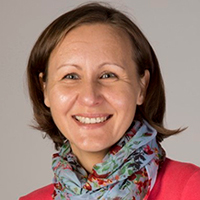 D.ª Agata Krzysztalowska
Profesor
Professor
DEA en Lingüística Aplicada a la Enseñanza del Español como Lengua Extranjera por la Universidad Antonio de Nebrija. Licenciada en Filología Hispánica por la Universidad Adam Mickiewicz de Poznan (Polonia).
D.ª Agata Krzysztalowska
Profesor
Professor
DEA en Lingüística Aplicada a la Enseñanza del Español como Lengua Extranjera por la Universidad Antonio de Nebrija. Licenciada en Filología Hispánica por la Universidad Adam Mickiewicz de Poznan (Polonia).
Tiene una amplia experiencia en el campo de Lingüística aplicada. Es profesora de Español como Lengua Extranjera y profesora de Polaco como Lengua de Herencia. Ha sido profesora asociada en diferentes universidades, entre otras, en la Universidad Complutense y en la Universidad de Murcia. Tiene una larga experiencia como editora de materiales de ELE en la Editorial SM, así como editora de proyectos de innovación educativa y contenidos digitales en la misma editorial. Es formadora de profesores de idiomas y formadora en el área de bilingüismo temprano (con especialidad en política lingüística familiar).
Desarrolló su formación en ELE como becaria de investigación y personal docente en la Universidad Antonio de Nebrija (en el Centro de Estudios Hispánicos y en el Departamento de Lenguas Aplicadas). Formó parte del equipo responsable de la puesta en marcha de la primera edición del master de ELE on line de la Universidad Antonio de Nebrija y después fue tutora de la asignatura Teorías de Adquisición de Lenguas Extranjeras. Actualmente imparte clases de Adquisición y Enseñanza del Léxico.
akrzyszt@nebrija.es
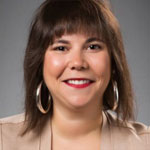 Dra. Alicia Luque
Profesora
Professor
Alicia Luque es Profesora Asociada de Lingüística Aplicada en la Universidad Nebrija. El Dr. Luque tiene un doctorado en español y lingüística de la Universidad de Illinois en Chicago (EE.UU.). Además, el Dr. Luque tiene una maestría en Estudios Hispánicos y un Certificado de Posgrado Avanzado en Adquisición y Enseñanza de Segundas Lenguas de la Universidad de Oregón (EE. UU.) y una maestría en Psicobiología y Neurociencia Cognitiva de la Universidad Autónoma de Barcelona (España). Así como un Máster en Estudios Ingleses, Comunicación Multilingüe e Intercultural y un Máster en Estudios Ingleses por la Universidad de Málaga (España). Antes de unirse a la Universidad Nebrija, la Dra. Luque ocupó cargos como científica investigadora postdoctoral en UiT The Arctic University of Norway y como profesora asistente de español y lingüística en Texas Tech University (EE.UU.), donde también dirigió el programa de español para hablantes bilingües de herencia. La agenda general de investigación del Dr. Luque es inherentemente colaborativa y multidisciplinaria y está informada por los campos de la (neuro)ciencia cognitiva, lingüística aplicada, y bilingüismo / multilingüismo y objetivos (a) identificar los factores relacionados con el aprendizaje exitoso de idiomas para adultos, (b) comprender cómo la experiencia de ser / convertirse en bilingüe impacta la mente humana, y (c) contribuir al desarrollo de nuevas formas de caracterizar el bilingüismo de adultos como la experiencia de vida inherentemente diversa y dinámica que es.
Dra. Alicia Luque
Profesora
Professor
Alicia Luque es Profesora Asociada de Lingüística Aplicada en la Universidad Nebrija. El Dr. Luque tiene un doctorado en español y lingüística de la Universidad de Illinois en Chicago (EE.UU.). Además, el Dr. Luque tiene una maestría en Estudios Hispánicos y un Certificado de Posgrado Avanzado en Adquisición y Enseñanza de Segundas Lenguas de la Universidad de Oregón (EE. UU.) y una maestría en Psicobiología y Neurociencia Cognitiva de la Universidad Autónoma de Barcelona (España). Así como un Máster en Estudios Ingleses, Comunicación Multilingüe e Intercultural y un Máster en Estudios Ingleses por la Universidad de Málaga (España). Antes de unirse a la Universidad Nebrija, la Dra. Luque ocupó cargos como científica investigadora postdoctoral en UiT The Arctic University of Norway y como profesora asistente de español y lingüística en Texas Tech University (EE.UU.), donde también dirigió el programa de español para hablantes bilingües de herencia. La agenda general de investigación del Dr. Luque es inherentemente colaborativa y multidisciplinaria y está informada por los campos de la (neuro)ciencia cognitiva, lingüística aplicada, y bilingüismo / multilingüismo y objetivos (a) identificar los factores relacionados con el aprendizaje exitoso de idiomas para adultos, (b) comprender cómo la experiencia de ser / convertirse en bilingüe impacta la mente humana, y (c) contribuir al desarrollo de nuevas formas de caracterizar el bilingüismo de adultos como la experiencia de vida inherentemente diversa y dinámica que es.
aluque@nebrija.es
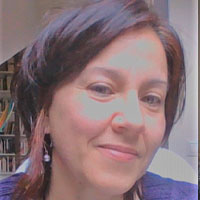 D.ª Ana María Martínez Lara
Profesora
Professor
Licenciada en Filología. Máster ELE por la Universidad de Alcalá de Henares. Ha sido profesora de ELE en la universidad de Túnez y en el Instituto Cervantes de Túnez y Beirut. Actualmente es coordinadora académica y profesora de ELE en el Centro de Lenguas de la Universidad Politécnica de Madrid, donde ha participado en diferentes proyectos de investigación relacionados con la integración de la tecnología en el aula de ELE. Ha realizado seminarios y talleres de formación de profesorado en universidades e institutos Cervantes de todo el mundo. Colabora con la editorial Difusión en la edición y elaboración de materiales didácticos. Es coautora de los manuales Campus Sur y Aula C1 y autora del Libro del profesor y material complementario de la colección Bitácora, todos ellos editados por Difusión.
D.ª Ana María Martínez Lara
Profesora
Professor
Licenciada en Filología. Máster ELE por la Universidad de Alcalá de Henares. Ha sido profesora de ELE en la universidad de Túnez y en el Instituto Cervantes de Túnez y Beirut. Actualmente es coordinadora académica y profesora de ELE en el Centro de Lenguas de la Universidad Politécnica de Madrid, donde ha participado en diferentes proyectos de investigación relacionados con la integración de la tecnología en el aula de ELE. Ha realizado seminarios y talleres de formación de profesorado en universidades e institutos Cervantes de todo el mundo. Colabora con la editorial Difusión en la edición y elaboración de materiales didácticos. Es coautora de los manuales Campus Sur y Aula C1 y autora del Libro del profesor y material complementario de la colección Bitácora, todos ellos editados por Difusión.
amartinezla@nebrija.es
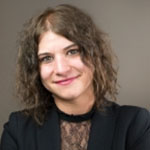 Dra. Ocarina Masid Blanco
Profesora
Professor
Doctora en Lengua española y Máster Universitario en Español como segunda lengua por la Universidad Complutense de Madrid y Licenciada en Filología Hispánica por la Universidad de Santiago de Compostela. Coordinadora académica del Doctorado en Lingüística aplicada a la enseñanza de lenguas de la Universidad Nebrija donde es profesora del Departamento de Lenguas aplicadas. Ha dirigido el Máster Universitario en Didáctica de ELE de esta misma universidad durante 6 años. Como miembro del grupo de investigación LAELE, sus líneas de investigación, en el marco de Lingüística cognitiva, se dirigen al impacto emocional de la metáfora y el lenguaje figurado en L1 y LE, su relación con otros procesos cognitivos, las aplicaciones didácticas de la teoría cognitiva de la metáfora y otros enfoques para la enseñanza-aprendizaje del léxico en ELE. Además, está interesada en metodologías activas (aprendizaje cooperativo, gamificación, clase invertida,) y TIC para la enseñanza del español y su impacto emocional en el aprendizaje. Ha participado en proyectos de investigación y de innovación docente sobre estas temáticas y cuenta con publicaciones científicas en revistas de impacto, capítulos de libro y una monografía en la editorial Arco/Libros.
Dra. Ocarina Masid Blanco
Profesora
Professor
Doctora en Lengua española y Máster Universitario en Español como segunda lengua por la Universidad Complutense de Madrid y Licenciada en Filología Hispánica por la Universidad de Santiago de Compostela. Coordinadora académica del Doctorado en Lingüística aplicada a la enseñanza de lenguas de la Universidad Nebrija donde es profesora del Departamento de Lenguas aplicadas. Ha dirigido el Máster Universitario en Didáctica de ELE de esta misma universidad durante 6 años. Como miembro del grupo de investigación LAELE, sus líneas de investigación, en el marco de Lingüística cognitiva, se dirigen al impacto emocional de la metáfora y el lenguaje figurado en L1 y LE, su relación con otros procesos cognitivos, las aplicaciones didácticas de la teoría cognitiva de la metáfora y otros enfoques para la enseñanza-aprendizaje del léxico en ELE. Además, está interesada en metodologías activas (aprendizaje cooperativo, gamificación, clase invertida,) y TIC para la enseñanza del español y su impacto emocional en el aprendizaje. Ha participado en proyectos de investigación y de innovación docente sobre estas temáticas y cuenta con publicaciones científicas en revistas de impacto, capítulos de libro y una monografía en la editorial Arco/Libros.
omasid@nebrija.es
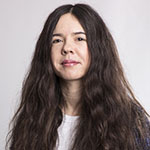 Dra. Eirini Mavrou
Profesora
Professor
Doctora en Lingüística Aplicada por la Universidad Antonio de Nebrija (Sobresaliente Cum Laude y Premio extraordinario de doctorado) y licenciada en Psicología por la Universidad Aristóteles de Tesalónica (Grecia). Actualmente trabaja como profesora contratada doctora en el Departamento de Lenguas de la Universidad Nebrija, es investigadora en el Centro de Investigación Nebrija en Cognición, y Senior Teaching Fellow en el Department of Culture, Communication and Media, UCL Institute of Education (UK). Sus líneas de investigación incluyen la adquisición de segundas lenguas, diferencias individuales, emoción y razonamiento moral. Sus publicaciones se pueden consultar en los siguientes enlaces: https://profiles.ucl.ac.uk/75919-irini-mavrou/publications y https://portalinvestigacion.nebrija.com/investigadores/644106/detalle
Dra. Eirini Mavrou
Profesora
Professor
Doctora en Lingüística Aplicada por la Universidad Antonio de Nebrija (Sobresaliente Cum Laude y Premio extraordinario de doctorado) y licenciada en Psicología por la Universidad Aristóteles de Tesalónica (Grecia). Actualmente trabaja como profesora contratada doctora en el Departamento de Lenguas de la Universidad Nebrija, es investigadora en el Centro de Investigación Nebrija en Cognición, y Senior Teaching Fellow en el Department of Culture, Communication and Media, UCL Institute of Education (UK). Sus líneas de investigación incluyen la adquisición de segundas lenguas, diferencias individuales, emoción y razonamiento moral. Sus publicaciones se pueden consultar en los siguientes enlaces: https://profiles.ucl.ac.uk/75919-irini-mavrou/publications y https://portalinvestigacion.nebrija.com/investigadores/644106/detalle
emavrou@nebrija.es
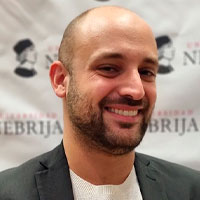 Aarón Pérez Bernabéu
Profesor
Professor
El profesor Aarón Pérez Bernabeu es licenciado en Filología Hispánica por la Universidad de Alicante (UA), Máster en Fonética y Fonología por la UIMP y el CSIC y Máster en Enseñanza de ELE por la UIMP y el Instituto Cervantes. En proceso de finalización de su Doctorado en Lingüística Aplicada en la Universitat d’Alacant (UA) y colaborador externo del grupo de investigación Adquisición de Lenguas Adicionales (ACQUA) de la UA. Es coordinador de formación en línea de la Editorial Edinumen. Profesor de posgrado en la Universidad Nebrija. Colabora en la creación de cursos y seminarios de Pronunciación en ELE para instituciones como el Instituto Cervantes, el Centro de Lenguas Modernas de la Universidad de Granada, la Universidad de Extremadura, la Universidad Internacional Menéndez Pelayo, entre otras. Sus líneas de investigación combinan los aspectos más teóricos de la Fonética y la Fonología con elementos prácticos de su didáctica, de ahí que tenga investigaciones tanto en el ámbito de la producción oral como de comprensión auditiva.
Aarón Pérez Bernabéu
Profesor
Professor
El profesor Aarón Pérez Bernabeu es licenciado en Filología Hispánica por la Universidad de Alicante (UA), Máster en Fonética y Fonología por la UIMP y el CSIC y Máster en Enseñanza de ELE por la UIMP y el Instituto Cervantes. En proceso de finalización de su Doctorado en Lingüística Aplicada en la Universitat d’Alacant (UA) y colaborador externo del grupo de investigación Adquisición de Lenguas Adicionales (ACQUA) de la UA. Es coordinador de formación en línea de la Editorial Edinumen. Profesor de posgrado en la Universidad Nebrija. Colabora en la creación de cursos y seminarios de Pronunciación en ELE para instituciones como el Instituto Cervantes, el Centro de Lenguas Modernas de la Universidad de Granada, la Universidad de Extremadura, la Universidad Internacional Menéndez Pelayo, entre otras. Sus líneas de investigación combinan los aspectos más teóricos de la Fonética y la Fonología con elementos prácticos de su didáctica, de ahí que tenga investigaciones tanto en el ámbito de la producción oral como de comprensión auditiva.
aperezbe@nebrija.es
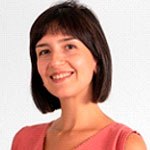 Dra. Clara Planchuelo Fernández
Profesora
Professor
Coordinadora de Prácticas (itinerario profesionalizante e investigador) en el Máster Universitario en Enseñanza de español como lengua extranjera: Didáctica e investigación. Profesora de Didáctica de la lengua española en el Máster Universitario en Formación del Profesorado (a distancia), y de Lengua española y comunicación I y Lengua española y comunicación II en los Grados de Educación Infantil, Primaria y Doble Grado en Educación Primaria y Psicología (presencial). Doctora en Psicolingüística (programa de Doctorado en Educación y Procesos Cognitivos) por Universidad Nebrija. Es graduada en Filología Hispánica (Universidad de Alcalá) y cuenta con el Máster en Formación de Profesores de Español como Lengua Extranjera (U. Alcalá), y el Máster en Cognición y Emoción en Contextos Educativos (U. Nebrija). Asimismo, es investigadora miembro del Grupo de investigación Cognición, emoción y diferencias individuales (CEDI, U. Nebrija) y el Affective Neuroscience and Cognition Group (AFNECO, Universidad Complutense de Madrid). Cuenta con diversas publicaciones científicas y divulgativas sobre psicolingüística afectiva. Su gran pasión profesional se centra en las áreas científicas que abordan el aprendizaje de lenguas extranjeras y la neurociencia cognitiva.
Dra. Clara Planchuelo Fernández
Profesora
Professor
Coordinadora de Prácticas (itinerario profesionalizante e investigador) en el Máster Universitario en Enseñanza de español como lengua extranjera: Didáctica e investigación. Profesora de Didáctica de la lengua española en el Máster Universitario en Formación del Profesorado (a distancia), y de Lengua española y comunicación I y Lengua española y comunicación II en los Grados de Educación Infantil, Primaria y Doble Grado en Educación Primaria y Psicología (presencial). Doctora en Psicolingüística (programa de Doctorado en Educación y Procesos Cognitivos) por Universidad Nebrija. Es graduada en Filología Hispánica (Universidad de Alcalá) y cuenta con el Máster en Formación de Profesores de Español como Lengua Extranjera (U. Alcalá), y el Máster en Cognición y Emoción en Contextos Educativos (U. Nebrija). Asimismo, es investigadora miembro del Grupo de investigación Cognición, emoción y diferencias individuales (CEDI, U. Nebrija) y el Affective Neuroscience and Cognition Group (AFNECO, Universidad Complutense de Madrid). Cuenta con diversas publicaciones científicas y divulgativas sobre psicolingüística afectiva. Su gran pasión profesional se centra en las áreas científicas que abordan el aprendizaje de lenguas extranjeras y la neurociencia cognitiva.
cplanchuelo@nebrija.es
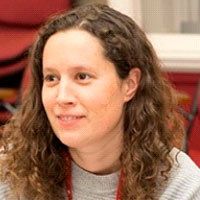 Dra. Margarita Planelles Almeida
Profesora
Professor
Doctora en Filosofía por la Universidad de Sevilla. Máster en Lingüística aplicada a la enseñanza del español como lengua extranjera por la Universidad Nebrija. Desde 2018 coordina la Cátedra global Nebrija-Santander del Español como lengua de migrantes y refugiados. Profesionalmente, ha trabajado como profesora de ELE en diferentes centros en España y en el extranjero, y como coach online de español con universidades de California (EEUU). También ha colaborado en la elaboración de materiales didácticos en una editorial especializada en materiales de ELE. Actualmente, es profesora en el Departamento de Lenguas Aplicadas de la Universidad Antonio de Nebrija. Como miembro del grupo de investigación LAELE, sus líneas de investigación se centran en los procesos de adquisición, aprendizaje y enseñanza del español como lengua adicional, con especial foco en contextos de migración. Ha participado en proyectos de investigación sobre estas temáticas y cuenta con publicaciones científicas en revistas de impacto y ponencias en diversos congresos internacionales.
Dra. Margarita Planelles Almeida
Profesora
Professor
Doctora en Filosofía por la Universidad de Sevilla. Máster en Lingüística aplicada a la enseñanza del español como lengua extranjera por la Universidad Nebrija. Desde 2018 coordina la Cátedra global Nebrija-Santander del Español como lengua de migrantes y refugiados. Profesionalmente, ha trabajado como profesora de ELE en diferentes centros en España y en el extranjero, y como coach online de español con universidades de California (EEUU). También ha colaborado en la elaboración de materiales didácticos en una editorial especializada en materiales de ELE. Actualmente, es profesora en el Departamento de Lenguas Aplicadas de la Universidad Antonio de Nebrija. Como miembro del grupo de investigación LAELE, sus líneas de investigación se centran en los procesos de adquisición, aprendizaje y enseñanza del español como lengua adicional, con especial foco en contextos de migración. Ha participado en proyectos de investigación sobre estas temáticas y cuenta con publicaciones científicas en revistas de impacto y ponencias en diversos congresos internacionales.
mplanelles@nebrija.es
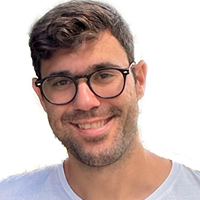 Dr. Cristian Requena Palacios
Profesor
Professor
Doctor en Educación y Comunicación Social por la Universidad de Málaga (UMA), con especialización en Didáctica de la Lengua y en el uso didáctico y constructivista de los memes en la enseñanza del español como L1 y L2. Máster en Formación del Profesorado y Graduado en Educación Primaria, con la especialidad de Lengua Extranjera, por la UMA. Experiencia docente en la enseñanza de ELE presencial y online, actualmente imparte clases online en su propia academia. Asimismo, en el ámbito universitario es docente en la asignatura Contextos de enseñanza-aprendizaje de ELE I perteneciente al Máster en Español como Lengua Extranjera: Didáctica e Investigación, de la Universidad Nebrija. Por otra parte, también cuenta con experiencia docente online en asignaturas del Máster de Formación del Profesorado impartidas, con anterioridad, en la Universidad Isabel I y, actualmente, en la Universidad Nebrija. En su labor docente combina teoría y práctica desde los enfoques constructivista, comunicativo y por tareas apostando por la innovación educativa y las metodologías activas. Asimismo, forma parte del Grupo de Investigación en Lectura, Escritura, Literatura y Bibliotecas (UMA).
Dr. Cristian Requena Palacios
Profesor
Professor
Doctor en Educación y Comunicación Social por la Universidad de Málaga (UMA), con especialización en Didáctica de la Lengua y en el uso didáctico y constructivista de los memes en la enseñanza del español como L1 y L2. Máster en Formación del Profesorado y Graduado en Educación Primaria, con la especialidad de Lengua Extranjera, por la UMA. Experiencia docente en la enseñanza de ELE presencial y online, actualmente imparte clases online en su propia academia. Asimismo, en el ámbito universitario es docente en la asignatura Contextos de enseñanza-aprendizaje de ELE I perteneciente al Máster en Español como Lengua Extranjera: Didáctica e Investigación, de la Universidad Nebrija. Por otra parte, también cuenta con experiencia docente online en asignaturas del Máster de Formación del Profesorado impartidas, con anterioridad, en la Universidad Isabel I y, actualmente, en la Universidad Nebrija. En su labor docente combina teoría y práctica desde los enfoques constructivista, comunicativo y por tareas apostando por la innovación educativa y las metodologías activas. Asimismo, forma parte del Grupo de Investigación en Lectura, Escritura, Literatura y Bibliotecas (UMA).
crequena@nebrija.es
 Dra. Anna Rufat Sánchez
Profesora
Professor
Anna Rufat es profesora del área de Lengua Española y coordinadora del Máster en Enseñanza de Español como Lengua Extranjera de la Universidad de Extremadura. También imparte docencia en el Máster en Español como Lengua Extranjera, de la Universidad Nebrija, donde está al cargo de la Enseñanza del vocabulario. Sus investigaciones se han centrado en la naturaleza del componente léxico y sus aplicaciones a la enseñanza del español, y ha abordado aspectos como la interlengua mediante análisis de corpus, el concepto de colocación, el léxico en los textos o las estrategias de aprendizaje del vocabulario.
Dra. Anna Rufat Sánchez
Profesora
Professor
Anna Rufat es profesora del área de Lengua Española y coordinadora del Máster en Enseñanza de Español como Lengua Extranjera de la Universidad de Extremadura. También imparte docencia en el Máster en Español como Lengua Extranjera, de la Universidad Nebrija, donde está al cargo de la Enseñanza del vocabulario. Sus investigaciones se han centrado en la naturaleza del componente léxico y sus aplicaciones a la enseñanza del español, y ha abordado aspectos como la interlengua mediante análisis de corpus, el concepto de colocación, el léxico en los textos o las estrategias de aprendizaje del vocabulario.
arufat@nebrija.es
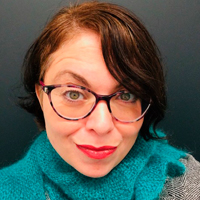 D.ª Miriam Patricia Sajeta de Souza
Profesora
Professor
Licenciada en Historia de Arte comparada por la Universidad de Buenos AiresUBA, continua sus estudios y se gradúa como Actriz Nacional, en la
especialización de Dramaturgia en la Universidad de Buenos Aires/IUNA. En 1998 realiza un posgrado de sobre Arte y Literatura Comparada en el Centro
Cultural Ricardo Rojas y finaliza sus En España se forma como Psicoterapeuta y Musicoterapeuta en la Universidad Autónoma de Madrid - UAM, y en la
Asociación de Psicoterapia Humanista - CIPHAR. En el año 2013 continua sus estudios en Terapia sistémica especializada en la ciudad de Augsburgo en el centro Psicoterapia Jameda Fleischer & Schneider. En el año 2014 se forma como docente de ELE y luego se especializa en Humboldt - Instituto en AICLE (Aprendizaje integrado de Contenidos y Lenguas) Desde hace 14 años colabora en calidad de profesora en la University of Applied
Sciences, en diferentes formaciones de los Institutos Cervantes y en el Máster de ELE de la Universidad de La Nebrija. Desde el 2017 ha trabajado como autora de materiales, formadora y ponente para las editoriales Hueber, Klett
y Difusión, tanto para Europa como para las ediciones de EE.UU. En el año 2023 crea la compañía CHIMICHURRI - TEATRO SONORO para niño/as, un espectáculo pedagógico musical para familias de lengua de herencia.
D.ª Miriam Patricia Sajeta de Souza
Profesora
Professor
Licenciada en Historia de Arte comparada por la Universidad de Buenos AiresUBA, continua sus estudios y se gradúa como Actriz Nacional, en la
especialización de Dramaturgia en la Universidad de Buenos Aires/IUNA. En 1998 realiza un posgrado de sobre Arte y Literatura Comparada en el Centro
Cultural Ricardo Rojas y finaliza sus En España se forma como Psicoterapeuta y Musicoterapeuta en la Universidad Autónoma de Madrid - UAM, y en la
Asociación de Psicoterapia Humanista - CIPHAR. En el año 2013 continua sus estudios en Terapia sistémica especializada en la ciudad de Augsburgo en el centro Psicoterapia Jameda Fleischer & Schneider. En el año 2014 se forma como docente de ELE y luego se especializa en Humboldt - Instituto en AICLE (Aprendizaje integrado de Contenidos y Lenguas) Desde hace 14 años colabora en calidad de profesora en la University of Applied
Sciences, en diferentes formaciones de los Institutos Cervantes y en el Máster de ELE de la Universidad de La Nebrija. Desde el 2017 ha trabajado como autora de materiales, formadora y ponente para las editoriales Hueber, Klett
y Difusión, tanto para Europa como para las ediciones de EE.UU. En el año 2023 crea la compañía CHIMICHURRI - TEATRO SONORO para niño/as, un espectáculo pedagógico musical para familias de lengua de herencia.
msajetas@nebrija.es
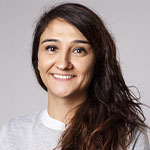 Dra. Teresa Simón Cabodevilla
Profesora
Professor
Teresa es doctora en Lingüística Aplicada a la Enseñanza de Lenguas por la Universidad Nebrija, donde obtuvo el premio extraordinario de doctorado en el curso 2021-2022. Máster en Lingüística Aplicada a la Enseñanza del español por la misma universidad, Máster en Enseñanza de ELE por la Universidad Complutense de Madrid (UCM), Licenciada en Filología Hispánica por la Universidad de Salamanca y poseedora del Certificate in Professional Studies por la Universidad de Liverpool. Ha trabajado como lectora MAEC-AECID en la Universidad de Jordania en Ammán (2007-2010) y en la Universidad de Delhi en India (2010-2013) donde dirigió la sección de español del Diploma Foreign Language Education formando a futuros profesores de español. Ha trabajado en China en la Universidad SWUST en la provincia de Sichuan (2013-2014) y en Jiangsu en Xi’an Jiaotong Liverpool University (2014-2018). Ha colaborado como profesora de español, de literatura, escritura creativa y formadora de profesores impartiendo diferentes talleres en los Institutos Cervantes de Ammán y Nueva Delhi. Es autora del libro Destrezas orales: expresión e interacción en ELE (Editorial UNED, 2017). Ha disfrutado de un contrato predoctoral en la Universidad Nebrija (2019-2021) para realizar un estudio sobre expresión de las emociones con alumnos sinohablantes aprendientes de español. Entre sus líneas de investigación se encuentran emoción y adquisición de LE/2L, léxico emocional, expresión e interacción orales, ELE para sinohablantes y español como lengua de personas migrantes y refugiadas. Forma parte del grupo de investigación LAELE (Lingüística Aplicada a la Enseñanza del Español como Lengua Extranjera).
Dra. Teresa Simón Cabodevilla
Profesora
Professor
Teresa es doctora en Lingüística Aplicada a la Enseñanza de Lenguas por la Universidad Nebrija, donde obtuvo el premio extraordinario de doctorado en el curso 2021-2022. Máster en Lingüística Aplicada a la Enseñanza del español por la misma universidad, Máster en Enseñanza de ELE por la Universidad Complutense de Madrid (UCM), Licenciada en Filología Hispánica por la Universidad de Salamanca y poseedora del Certificate in Professional Studies por la Universidad de Liverpool. Ha trabajado como lectora MAEC-AECID en la Universidad de Jordania en Ammán (2007-2010) y en la Universidad de Delhi en India (2010-2013) donde dirigió la sección de español del Diploma Foreign Language Education formando a futuros profesores de español. Ha trabajado en China en la Universidad SWUST en la provincia de Sichuan (2013-2014) y en Jiangsu en Xi’an Jiaotong Liverpool University (2014-2018). Ha colaborado como profesora de español, de literatura, escritura creativa y formadora de profesores impartiendo diferentes talleres en los Institutos Cervantes de Ammán y Nueva Delhi. Es autora del libro Destrezas orales: expresión e interacción en ELE (Editorial UNED, 2017). Ha disfrutado de un contrato predoctoral en la Universidad Nebrija (2019-2021) para realizar un estudio sobre expresión de las emociones con alumnos sinohablantes aprendientes de español. Entre sus líneas de investigación se encuentran emoción y adquisición de LE/2L, léxico emocional, expresión e interacción orales, ELE para sinohablantes y español como lengua de personas migrantes y refugiadas. Forma parte del grupo de investigación LAELE (Lingüística Aplicada a la Enseñanza del Español como Lengua Extranjera).
tsimon@nebrija.es
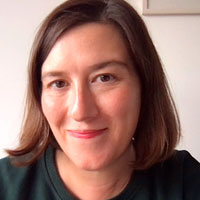 Dra. Lola Torres Ríos
Profesora
Professor
Doctora en Didáctica de la lengua y la literatura, máster de formación de profesores de ELE y máster de didáctica de la lengua (Universidad de Barcelona). Es profesora de ELE a adultos (IES Barcelona) y es tutora en diferentes programas universitarios, como la Universidad de Nebrija. También colabora en el diseño y creación de materiales en diversas editoriales de idiomas. Dirige y tutoriza cursos sobre competencia digital e innovación educativa en el Centro de Formación de Profesores del Instituto Cervantes. Actualmente dirige también la escuela de formación de profesores de idiomas Campamento Norte. Tiene experiencia como coordinadora académica, equipo directivo, responsable de evaluación y de formación del profesorado en UAB Idiomes (Universidad Autónoma de Barcelona). Sus áreas de especialización son las TIC, la gestión de aula, la competencia audiovisual y las estrategias de aprendizaje.
Dra. Lola Torres Ríos
Profesora
Professor
Doctora en Didáctica de la lengua y la literatura, máster de formación de profesores de ELE y máster de didáctica de la lengua (Universidad de Barcelona). Es profesora de ELE a adultos (IES Barcelona) y es tutora en diferentes programas universitarios, como la Universidad de Nebrija. También colabora en el diseño y creación de materiales en diversas editoriales de idiomas. Dirige y tutoriza cursos sobre competencia digital e innovación educativa en el Centro de Formación de Profesores del Instituto Cervantes. Actualmente dirige también la escuela de formación de profesores de idiomas Campamento Norte. Tiene experiencia como coordinadora académica, equipo directivo, responsable de evaluación y de formación del profesorado en UAB Idiomes (Universidad Autónoma de Barcelona). Sus áreas de especialización son las TIC, la gestión de aula, la competencia audiovisual y las estrategias de aprendizaje.
ltorresr@nebrija.es
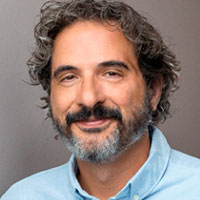 D. Sergio Troitiño Chinarro
Profesor
Professor
Sergio Troitiño es licenciado en Filología Hispánica y máster en Formación de Profesores de Español como Lengua Extranjera (Universidad de Barcelona). Ha sido profesor de español para extranjeros en Barcelona y en Chicago. Ha impartido cursos de formación en instituciones y centros de enseñanza de ELE de todo el mundo. Trabaja en la editorial Difusión como formador de profesores y asesor pedagógico desde 2006. También ha participado en proyectos editoriales como Gente hoy, Yo que tú: manual de gramática y poesía o Cuadernos de didáctica. Está vinculado a proyectos formativos en línea para Klett World Languages y Difusión, como los Webinars ELE, Teleseminarios y Telejornadas. Es coautor de Cuadernos de gramática española y Complementos de gramática y vocabulario de la nueva edición del curso Aula y autor de varios artículos sobre la enseñanza del léxico. Sus ámbitos de experticia incluyen el análisis y la creación de materiales, la gramática pedagógica, la dimensión léxica en la enseñanza de L2, el uso de la tecnología en la enseñanza y en el aprendizaje con particular énfasis en entornos virtuales y también en la implementación de la IA en las diversas dimensiones de la enseñanza y aprendizaje de español L2/LE.
D. Sergio Troitiño Chinarro
Profesor
Professor
Sergio Troitiño es licenciado en Filología Hispánica y máster en Formación de Profesores de Español como Lengua Extranjera (Universidad de Barcelona). Ha sido profesor de español para extranjeros en Barcelona y en Chicago. Ha impartido cursos de formación en instituciones y centros de enseñanza de ELE de todo el mundo. Trabaja en la editorial Difusión como formador de profesores y asesor pedagógico desde 2006. También ha participado en proyectos editoriales como Gente hoy, Yo que tú: manual de gramática y poesía o Cuadernos de didáctica. Está vinculado a proyectos formativos en línea para Klett World Languages y Difusión, como los Webinars ELE, Teleseminarios y Telejornadas. Es coautor de Cuadernos de gramática española y Complementos de gramática y vocabulario de la nueva edición del curso Aula y autor de varios artículos sobre la enseñanza del léxico. Sus ámbitos de experticia incluyen el análisis y la creación de materiales, la gramática pedagógica, la dimensión léxica en la enseñanza de L2, el uso de la tecnología en la enseñanza y en el aprendizaje con particular énfasis en entornos virtuales y también en la implementación de la IA en las diversas dimensiones de la enseñanza y aprendizaje de español L2/LE.
stroitino@nebrija.es
More Academic Information
Learning Outcomes
Knowledge or content (Knowledge)- Graduates will be able to contrast the ideas and explanations that are currently used about the processes of language learning in different contexts.
- Graduates will be able to summarize the contributions of the different methodological approaches for the teaching of Spanish as a foreign language, as well as current methodological trends.
- Graduates will be able to explain the different levels of didactic programming: curriculum, program, didactic unit and lesson plan.
- Graduates will be able to handle the reference documents of the regulatory institutions of the foreign language teaching systems, as well as the tools for analyzing the environment and analyzing the needs of the learners in order to design the courses.
- Graduates will be able to design activities and will validate resources that favor the acquisition of vocabulary and grammar.
- Graduates will be able to relate the main procedures and strategies to introduce the intercultural contents in the didactics of SFL.
- Graduates will be able to compile advanced methodological studies of the teaching of SFL according to an approach of integrated learning of language and academic content (CLIL).
- Graduates will be able to analyze the factors that intervene in the learning process and use of SFL, the methodological approaches and the most appropriate didactic and evaluation resources for teaching SFL to different profiles of students (children and adolescents, Chinese speakers, learners of neighboring languages).
- Graduates will be able to detect and solve the learning problems of the non-native learner related to the phonetic and orthographic forms of words, sentences and texts in Spanish.
- Graduates will be able to compile and establish at an advanced level the fundamentals of the didactics of pronunciation, intonation and spelling in SFL.
- Graduates will be able to apply the main procedures, techniques and tests of statistical analysis for the processing and interpretation of data.
- Graduates may apply different techniques for the construction of scientific texts that are typical of professional and academic communication (research article, doctoral thesis, review, conference communication, etc.).
- Graduates will be able to critically analyze experiences in the foreign language classroom considering the new learning models.
- Graduates will be able to effectively and coherently program a lesson plan in the field of teaching Spanish as a foreign language.
- Graduates will be able to design comprehension, expression, interaction and oral and written mediation activities, aimed at SFL learners of different levels of SFL proficiency.
- Graduates will be able to integrate into the communicative activities the exercise of metacognitive, cognitive and socio-affective strategies that facilitate the resolution of the task for the learner, in order to favor their autonomous learning of the language.
- Graduates will be able to adequately plan the practice of the different communication skills, in relation to both the linguistic content and the learning processes.
- Graduates will be able to reflect to later analyze the suitability of the process of correction, evaluation and self-assessment in relation to the learning objectives.
- Graduates will be able to critically evaluate the effectiveness and suitability of the different existing systems and techniques of evaluation within the SFL classroom.
- Graduates will be able to analyze the lexical and grammatical contents of main interest or difficulty for learning SFL and reflect on them.
- Graduates will be able to demonstrate a broad level of understanding of relevant linguistic, communicative and cultural aspects in learning and teaching the vocabulary and grammar of Spanish as L2.
- Graduates will be able to analyze the possible linguistic-cultural misunderstandings that may occur in intercultural communication.
- Graduates will be able to elaborate proposals for an effective communication in intercultural contexts.
- Graduates will be able to critically examine the contributions of digital resources for language learning and manage the basic digital tools for the creation of SFL teaching activities.
- Graduates will be able to analyze the basic components involved in programming a specialty course and develop didactic proposals to work on them in their specific context (Business Spanish, Spanish for the academic field, Spanish as an immigration language, etc.).
- Graduates will be able to develop at an advanced level didactic proposals based on the CLIL methodology.
- Graduates will be able to design SFL didactic proposals at an advanced level for learners of different profiles and contexts.
- Graduates will be able to organize in a specialized way different didactic resources to design didactic activities that will help the learner practice pronunciation, intonation and spelling.
- Graduates may apply to new or little-known environments, within broader or multidisciplinary contexts, the concepts, principles, theories, models and methodologies related to the different fields of linguistics applied to the teaching of foreign languages, relevant to the field of the Spanish language.
- Graduates will be able to adequately and originally create reasoned arguments and formulate reasonable hypotheses in the field of language teaching, psycholinguistics and sociolinguistics.
- Graduates may apply ideas developed in academic articles, or in reports of research, design and innovation projects, in order to demonstrate a high ability for reflection and criticism.
- Graduates will be able to prepare a written report of the integration process in the work team and the contributions made during the internship period, demonstrating the ability to reflect on the tasks performed.
- Graduates will be able to simulate didactic and educational intervention proposals that are adapted to different contexts or empirical studies related to a specific aspect of the area of applied linguistics.
- Graduates will be able to elaborate a didactic project or an empirical study related to the teaching-learning of SFL in the form of a written report and orally defend it before a university tribunal.
- Graduates may distinguish the factors that affect the process of acquisition and learning of a foreign language.
- Graduates will be able to use logical reasoning and coherent reflection and analysis procedures to apply them to any lexical and grammatical content within the scope of Spanish as a foreign language.
- Graduates will be able to explain the principles that regulate the use of language in communicative exchanges, especially those that occur between people of different cultures in an educational context.
- Graduates will be able to formulate and coherently link objectives of their projects and their teaching and didactic products in the field of Spanish as a foreign language.
- Graduates will be able to incorporate strategies and didactic resources in a specialized way to the design and implementation in the classroom of activities typical of the CLIL approach.
- Graduates will be able to reflect on different profiles of students in specific contexts of the field of teaching Spanish as a foreign language.
- Graduates will be able to develop learning skills that allow self-directed or autonomous training and research in the area of Spanish as a foreign language.
- Graduates will be able to develop a positive attitude towards fundamental rights, specifying these principles in cooperative learning and respect for scientific and research ethics.
- Graduates may incorporate specialized knowledge, through personal research or by consulting research results in publications or specialized forums in the field of Spanish as a foreign language.
- Graduates will be able to effectively apply the concepts, tools, resources and methods learned in the Master's subjects to professional performance in the context of teaching and learning Spanish as a foreign language, at the service of a teaching project and integrating into a work team under the supervision of a tutor.
- Graduates will be able to develop and interpret data to issue judgments from specialized bibliography in the field of Spanish as a foreign language.
- Graduates will be able to strengthen the effective and creative use of skills that are typical of intellectual work in the specific area of the mother tongue and communication.
Online Study
Admission
Admission requirementsAdmission profile:
- Graduates of a Bachelor's degree or equivalent, in the areas of Philology, Linguistics, Translation, Education, Humanities and Communication Sciences.
- The program may be accessed from other university degrees as long as the candidate has experience in teaching-learning other foreign languages, complementary training in foreign language didactics and has the interests of a future SFL teacher.
In the event that the candidate's mother tongue is not Spanish, they must prove a B2 level of Spanish, through any accredited certificate. Candidates who do not have any official certificate of proficiency in SFL must take the SFL language proficiency test from Nebrija University and reach a B2 level.
The procedure in great detail and the list of documentation to be submitted are publicly accessible in a document [+info] that is completed with the calendar of the enrollment process.
In addition to the legal requirements, the university requires passing its own admission tests that will have the following weighting:
- Academic record [30%]: The grades obtained by the candidate in their previous studies will be assessed.
- Structured personal interview [30%]: The suitability of the candidate will be assessed by virtue of their experience, knowledge, technical and professional skills required to successfully take the intended studies. Their motivation and attitudes will also be assessed, as well as other personal aspects that contribute to their adequate adjustment to the chosen studies. The interview will be conducted in Spanish.
- Presentation document of the candidate [10%]: In a personally-prepared document, the candidate will explain their motivation and interest in the requested studies, as well as any other personal circumstance that they consider relevant for the selection process.
- Program-specific test [30%] Questions with closed and open answers about the mechanisms that regulate the use of the Spanish language, the difficulties of Spanish as a non-native language and the teaching of Spanish as a foreign language.
In the event that the candidate's mother tongue is not Spanish, they must prove a B2 level of Spanish, through any accredited certificate. Candidates who do not have any official certificate of proficiency in SFL must take the SFL language proficiency test from Nebrija University and reach a B2 level.
Once the admission tests have been completed, the Admissions Committee analyzes the results and the documentation submitted by the candidate, and approves or rejects the application.
The Admissions Committee will be made up of the Vice Rector for Academic Organization and Faculty, the Director of University Development, the Dean of the School, the Registrar of the University. Any of them may delegate to any person in their department.
The candidate receives written information about their admission, about the process of formalizing their enrollment in the Program and about the final, duly legalized, documentation that they must submit.
Employability
Career Opportunities
Graduates in Spanish as a Foreign Language: Didactics and Research may work as:
Collaboration Agreements for Professional Internships
This Master program maintains collaboration agreements for professional internships with some of the leading companies and institutions in the sector, including:
More Information of Internships in CompaniesTestimonials
University Life in Spanish as a Foreign Language: Didactics and Research
Visit all the Activities of the School of Language and Education
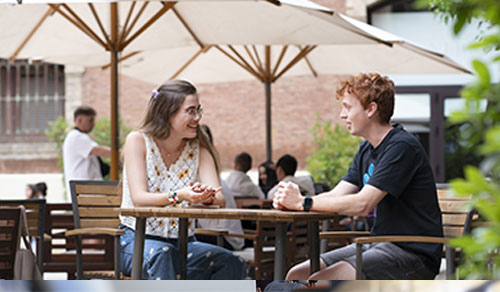
EMILIA Project: TransferLAELE
The didactic applications in which the LAELE Research Group has been working as a result of the R&D projects it develops are included in the TransferLAELE publication, a resource available to teachers of Spanish as a new language, where they will find innovative didactic proposals aimed at different groups of students and levels of language learning. [Read more]
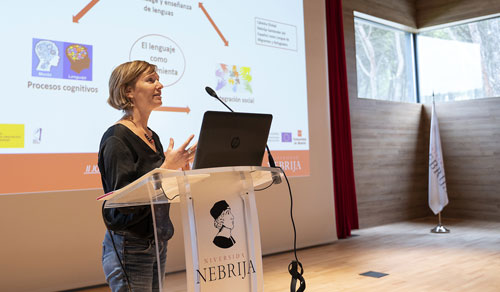
LAELE research group
The research group is part of the School of Languages and Education of the University, and its objective is to understand how we acquire and process foreign languages, especially Spanish and English, from an interdisciplinary point of view, which includes applied linguistics, psycholinguistics and cognitive linguistics. [Read more]

Nebrija Journal of Linguistics applied to language teaching
Periodical publication that analyzes and deals with different topics on language teaching and that has the collaboration of great leaders in the sector. [Read more]
4th Nebrija International Congress on Linguistics Applied to Language Teaching
The School of Languages and Education organized this congress that serves as a meeting point for researchers and teachers, both experts and new members, to have the opportunity to share the results of their studies and didactic experiences.
Opening ceremony of the academic year
Opening Ceremony for the 2022-2023 academic year at the Madrid-Princesa Campus of Nebrija University




